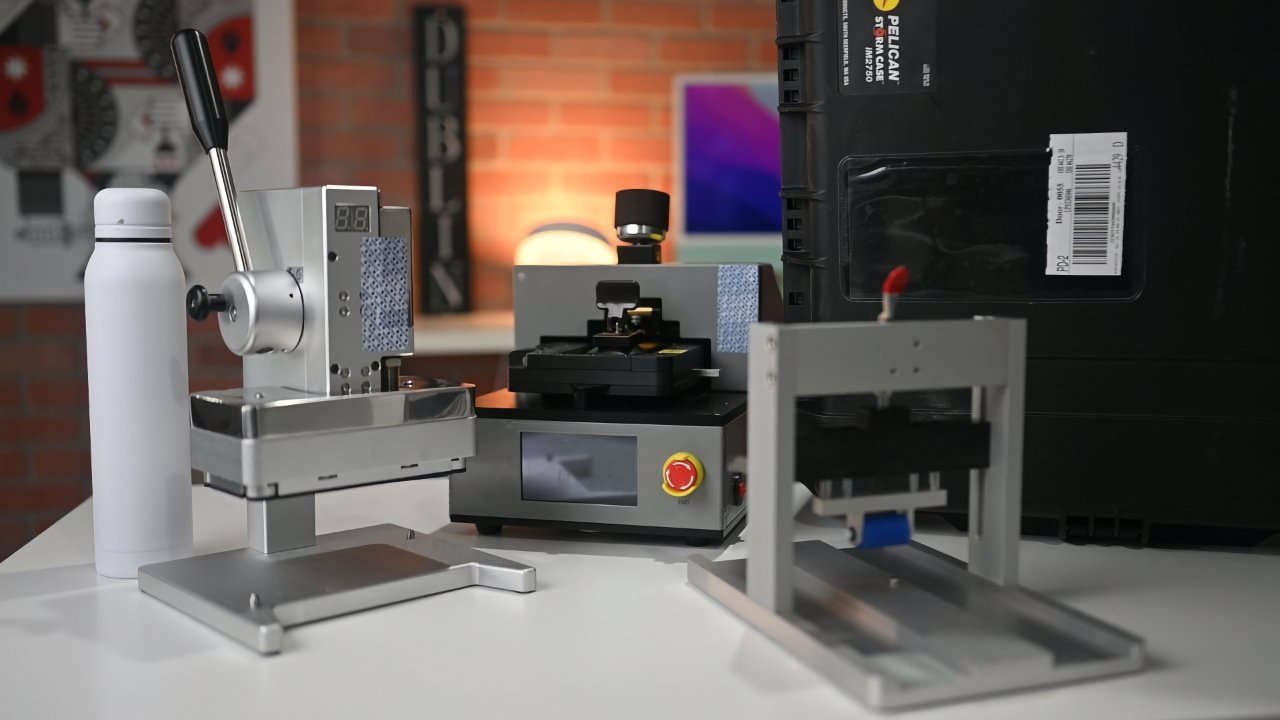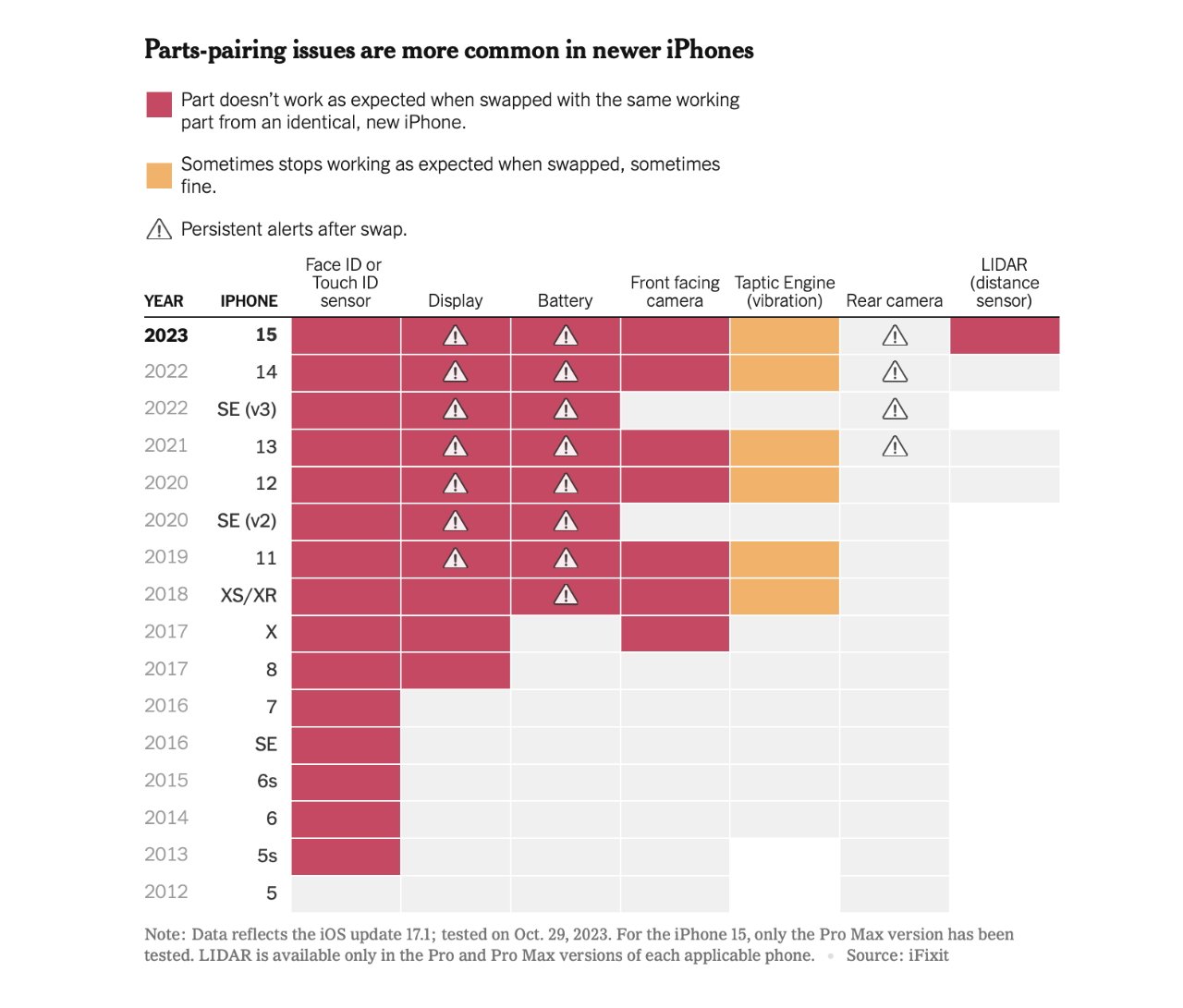Apple's iPhone parts pairing is making the company billions
The New York Times says that iPhone include code to identify when repair components are bought from Apple -- and to intentionally fail if alternatives are used.

An Apple repair toolkit
Apple famously used to object to all "right to repair" moves to make it allow iPhone owners to go to independent repairers, to the extent that it allegedly got legislation watered down. It then launched its own repair service, and also backed California's right to repair bill.
However, the New York Times claims that for all its apparent change of heart regarding repairs, Apple has taken steps to made sure only its own parts can be used. As well as thereby profiting from selling parts, the publication says this drives people to AppleCare+, which now earns Apple an estimated $9 billion annually.
"Unlike cars, which can be repaired with generic parts by auto shops and do-it-yourself mechanics," says the publication, "new iPhones are coded to recognize the serial numbers for original components and may malfunction if the parts are changed."
"This year, seven iPhone parts can trigger issues during repairs, up from three in 2017, when the company introduced a facial recognition system to unlock the device," continues the newspaper, "according to iFixit, a company that analyzes iPhone components and sells parts for do-it-yourself repairs."
The seven parts referred to are:
- Face ID or Touch ID sensor
- Display
- Battery
- Front-facing camera
- Taptic Engine
- Rear camera
- LiDAR sensor
Of these, the publication quotes iFixit as saying that five of the seven do not work even when a part is "swapped with the same working part from an identical, new iPhone." Those five are the Face ID or Touch ID sensor, display, battery, front camera, and the LiDAR sensor.
Of the rest, the taptic engine is inconsistent, "sometimes stops working as expected when swapped, sometimes fine." The display, battery, and rear camera also make the iPhone issue "persistent alerts after swap."
The New York Times says that this is a software issue that is known as "parts pairing," and that in recent years, "only approved parts and sanctioned repairs have avoided the problems."
This wouldn't seem to explain how original Apple parts swapped from one iPhone to another are failing, but the account does not go into that detail.

This year's iPhone 15 range repairability compared to previous years (source: NYT)
The New York Times has, though, said that such parts pairing has been used by Hewlett Packard in its ink cartridges, Tesla in its cars, and John Deere in farm equipment.
It does not say that Apple has acknowledged or admitted the practice. But it does say that "Apple and other companies have defended the practice by saying it protects customers' safety and the company's brand."
An Apple spokesperson referred the publication to its new self-repair program. "We have been innovating to offer our customers the best choice and options when their product needs service," said the spokesperson.
Oregon's state senator Janeen Sollman is reportedly one of a group of lawmakers looking to make it illegal for Apple to have any restrictions on repairs. Sollman was invited to Apple Park and told how the company sees repairs as an important security and safety topic.
She says that she was not persuaded. "I said, 'you're making it more accessible, but it's not a true right to repair if you have ultimate control," Sollman said.
Apple launched its Self Service Repair program for iPhones in 2022, and expanded it to Mac shortly afterwards in 2023. Users of the program have to buy iPhone components from Apple, and also buy or rent the tools with which to make the repair.
Read on AppleInsider

Comments
If they want to, cough, innovate, cough, then it's time to find ways to open up the official parts and compatible parts markets for downstream competition.
Out of warranty repair 'authorisation/validation' should always be in the hands of the end user.
For starters, a known good part from an identical phone should be able to be user authorised.
Any warranty repair should not require return of the failed part to Apple either. That decision should also be with the user.
The directives are designed to work alongside each other so things like the batteries directive hit on both right to repair and environmental aspects.
I would expect Apple and everyone else who plays the serialisation card to get looked at.
Be careful with what you wish for because just such a move might appear at some point.
Why do you think the EU processor initiative came into being?
Knock-off batteries and power adapters can also pose a safety hazard to users and I would highly recommend only purchasing the Apple versions of these even if they cost a few bucks more.
And how's that initiative coming along?
But you know in these times when everyone is starring at their phones, no one can think of anything but Apple and iPhones and App stores.
I have used iPhones only since 2007 and have never had a device fail on me (with the exception of a single battery expansion which was repaired).
The bottom line is that if not abused they are incredibly durable due to their build quality. My friends that use other devices have produced much more e-waste.
In all cases I have handed my used iPhones down to family members or resold them on eBay after two to three years of use.
But beyond a certain age, customers may have little option other than take their chances with third-party repairs, since Apple doesn’t let the Authorised Service Providers stock parts for any item declared “obsolete,” aka about seven years old.
I have no doubt that some, maybe even most, third-party parts are just fine and do not pose either a safety or security threat. But you can never be sure, especially when it comes to cheap repairs.
If you haven’t already, take a look at the (at least) two articles AppleInsider has done about counterfeit Apple product knockoffs, using CT scans to prove that they are very poorly engineered and use cheaper parts that are designed not to last much longer than it takes to get your money. You should assume that cheap third-party replacement parts are built to the same standards.
Cars need that specialist diagnostic software and expertise not because it's actually mechanically required, but because manufacturers deliberately build in VIN-locking and will go after anyone who tries to circumvent it with a DMCA 1201 suit.